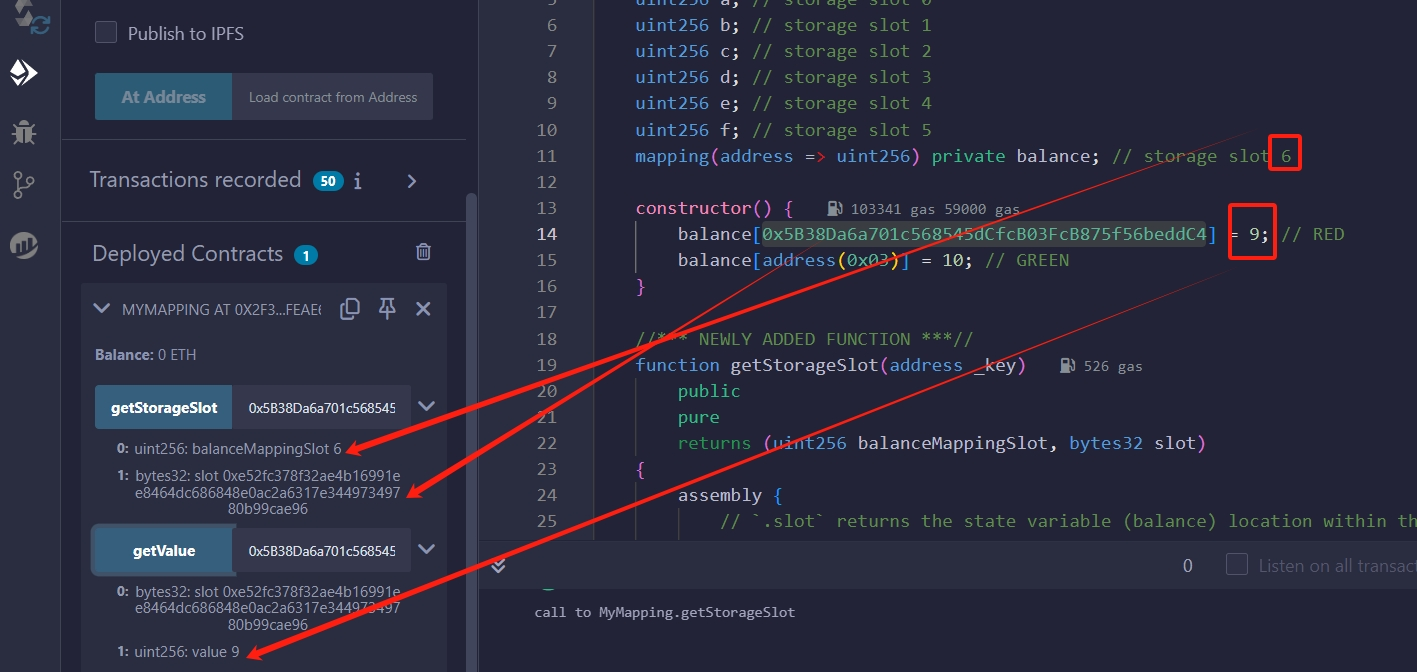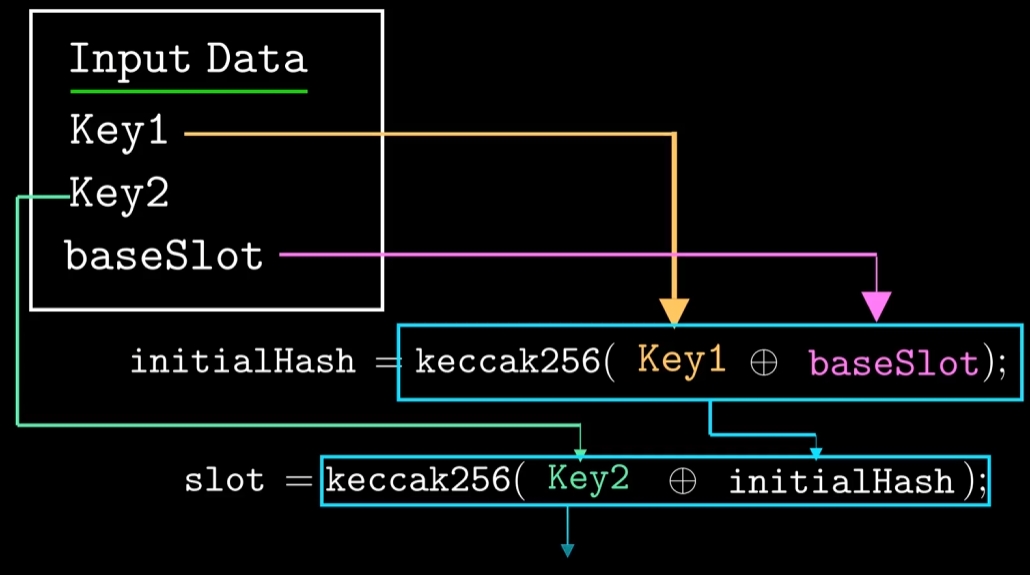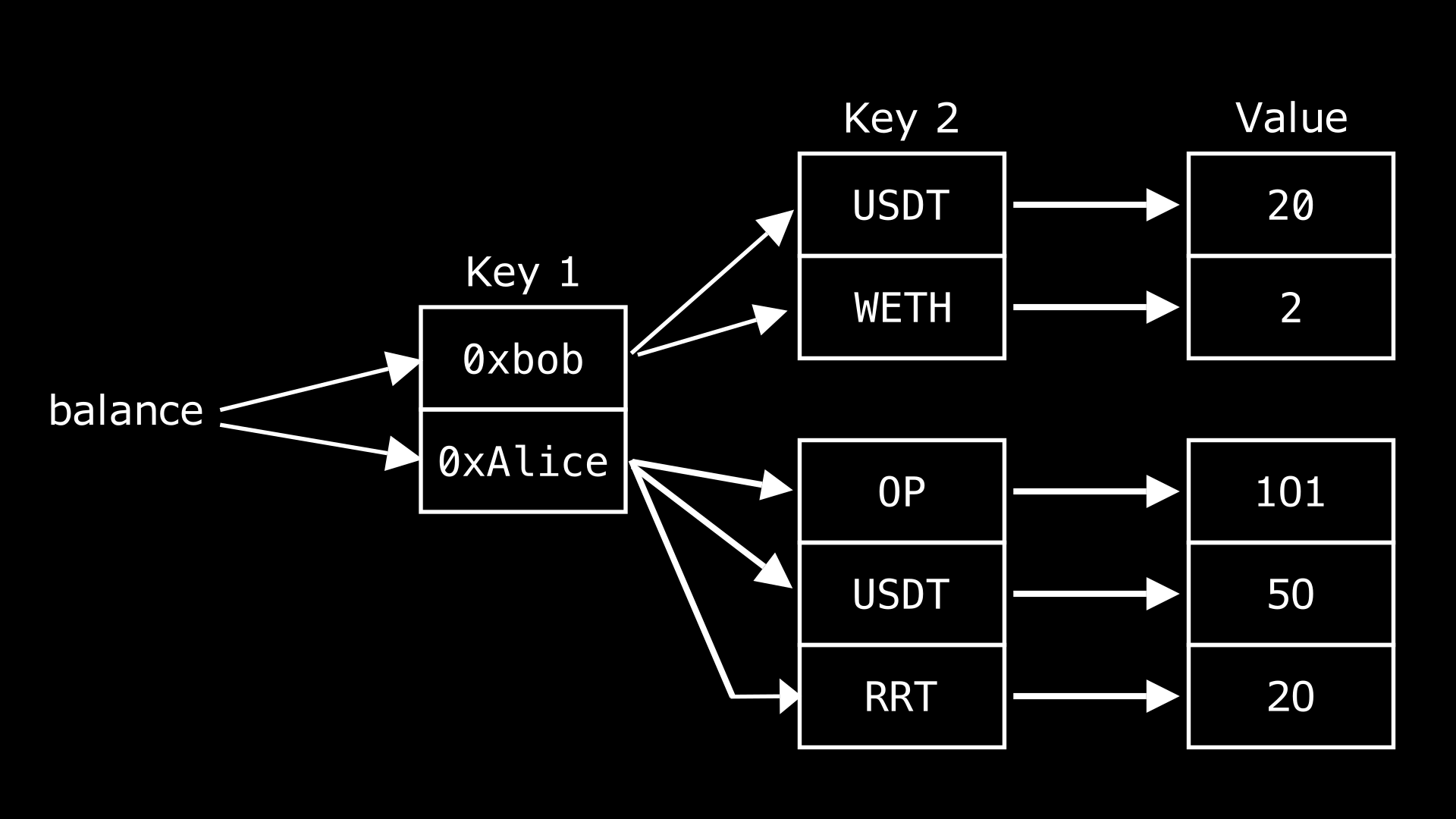Solidity参数
动态数据类型存储
Mapping数据存储
Mapping value数据的存储位置和声明顺序baseSlot以及key值相关- 直接聚合
bytes32(Key)和bytes32(baseSlot) - 哈希聚合结果,找出
mapping value的真实数据存位置
- 直接聚合

// SPDX-License-Identifier: MIT
pragma solidity =0.8.26;
contract MyMapping {
uint256 a; // storage slot 0
uint256 b; // storage slot 1
uint256 c; // storage slot 2
uint256 d; // storage slot 3
uint256 e; // storage slot 4
uint256 f; // storage slot 5
mapping(address => uint256) private balance; // storage slot 6
mapping(string => uint256) private strbalance; // storage slot 7
constructor() {
strbalance["aaa"] = 9; // RED
balance[address(0x1)] = 7;
}
//*** NEWLY ADDED FUNCTION ***//
function getStorageSlot(address _key)
public
pure
returns (uint256 balanceMappingSlot, bytes32 slot)
{
assembly {
// `.slot` returns the state variable (balance) location within the storage slots.
// In our case, balance.slot = 6
balanceMappingSlot := balance.slot
}
slot = keccak256(
abi.encode(
bytes32(abi.encode(_key)),
bytes32(abi.encode(balanceMappingSlot))
)
);
}
function getValue(address _key)
public
view
returns (bytes32 slot, uint256 value)
{
// CALL HELPER FUNCTION TO GET SLOT
(, slot) = getStorageSlot(_key);
assembly {
// Loads the value stored in the slot
value := sload(slot)
}
}
//*** NEWLY ADDED FUNCTION ***//
function getStringStorageSlot(string memory key)
public
pure
returns (uint256 balanceMappingSlot, bytes32 slot)
{
assembly {
// `.slot` returns the state variable (strbalance) location within the storage slots.
balanceMappingSlot := strbalance.slot
}
slot = keccak256(
abi.encodePacked(
abi.encodePacked(key),
bytes32(abi.encode(balanceMappingSlot))
)
);
}
function getStringValue(string memory _key)
public
view
returns (bytes32 slot, uint256 value)
{
// CALL HELPER FUNCTION TO GET SLOT
(, slot) = getStringStorageSlot(_key);
assembly {
// Loads the value stored in the slot
value := sload(slot)
}
}
}

Seaport获取 Mapping值
// error ChannelClosed(address channel)
uint256 constant ChannelClosed_error_signature = (
0x93daadf200000000000000000000000000000000000000000000000000000000
);
uint256 constant ChannelClosed_error_ptr = 0x00;
uint256 constant ChannelClosed_channel_ptr = 0x4;
uint256 constant ChannelClosed_error_length = 0x24;
// For the mapping:
// mapping(address => bool) channels
// The position in storage for a particular account is:
// keccak256(abi.encode(account, channels.slot))
uint256 constant ChannelKey_channel_ptr = 0x00;
uint256 constant ChannelKey_slot_ptr = 0x20;
uint256 constant ChannelKey_length = 0x40;
contract Conduit {
// Track the status of each channel.
mapping(address => bool) private _channels;
/**
* @notice Ensure that the caller is currently registered as an open channel
* on the conduit.
*/
modifier onlyOpenChannel() {
// Utilize assembly to access channel storage mapping directly.
assembly {
// Write the caller to scratch space.
mstore(ChannelKey_channel_ptr, caller())
// Write the storage slot for _channels to scratch space.
mstore(ChannelKey_slot_ptr, _channels.slot)
// Derive the position in storage of _channels[msg.sender]
// and check if the stored value is zero.
if iszero(
sload(keccak256(ChannelKey_channel_ptr, ChannelKey_length))
) {
// The caller is not an open channel; revert with
// ChannelClosed(caller). First, set error signature in memory.
mstore(ChannelClosed_error_ptr, ChannelClosed_error_signature)
// Next, set the caller as the argument.
mstore(ChannelClosed_channel_ptr, caller())
// Finally, revert, returning full custom error with argument
// data in memory.
// revert(abi.encodeWithSignature(
// "ChannelClosed(address)", caller()
// ))
revert(ChannelClosed_error_ptr, ChannelClosed_error_length)
}
}
// Continue with function execution.
_;
}
}
嵌套Mapping数据存储
- Mapping(key=>Mapping(…))
- 多重嵌套
mapping的slot存储规则- 每层的
key作为下层的baseSlot值参与计算 - 最外层的
key和参数声明顺序相关
- 每层的


// SPDX-License-Identifier: MIT
pragma solidity =0.8.26;
contract MyNestedMapping {
uint256 a; // storage slot 0
uint256 b; // storage slot 1
uint256 c; // storage slot 2
uint256 d; // storage slot 3
uint256 e; // storage slot 4
uint256 f; // storage slot 5
mapping(address => mapping(uint256 => uint256)) public balance; // storage slot 6
constructor() {
balance[0x5B38Da6a701c568545dCfcB03FcB875f56beddC4][123] = 9; // RED
}
//*** NEWLY ADDED FUNCTION ***//
function getStorageSlot(address key1, uint256 key2)
public
pure
returns (uint256 balanceMappingSlot, bytes32 slot)
{
assembly {
// `.slot` returns the state variable (balance) location within the storage slots.
// In our case, balance.slot = 6
balanceMappingSlot := balance.slot
}
bytes32 slot1 = keccak256(
abi.encode(
bytes32(abi.encode(key1)),
bytes32(abi.encode(balanceMappingSlot))
)
);
slot = keccak256(abi.encode(bytes32(abi.encode(key2)), slot1));
}
function getValue(address key1, uint256 key2)
public
view
returns (bytes32 slot, uint256 value)
{
// CALL HELPER FUNCTION TO GET SLOT
(, slot) = getStorageSlot(key1, key2);
assembly {
// Loads the value stored in the slot
value := sload(slot)
}
}
function convert(string memory key) internal pure returns (bytes32 ret) {
require(bytes(key).length <= 32);
assembly {
ret := mload(add(key, 32))
}
}
}